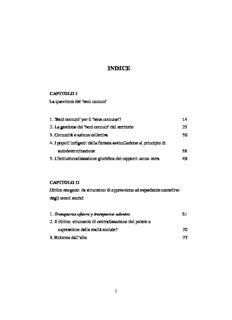Table Of ContentINDICE
CAPITOLO I
La questione dei 'beni comuni'
1. 'Beni comuni' per il 'bene comune'? 14
2. La gestione dei 'beni comuni' del territorio 25
3. Comunità e azione collettiva 30
4. I popoli indigeni: dalla forzata assimilazione al principio di
autodeterminazione 38
5. L'istituzionalizzazione giuridica dei rapporti uomo-terra 49
CAPITOLO II
Diritto esogeno: da strumento di oppressione ad espediente correttivo
degli errori storici
1. Tranqueras afuera y tranqueras adentro 61
2. Il diritto: strumento di centralizzazione del potere o
espressione della realtà sociale? 70
3. Riforme dall‟alto 75
1
4. L‟Organizzazione Internazionale del Lavoro 82
5. La Convenzione ILO n. 169 84
6. Terre e territori: la tutela della ILO169 93
CAPITOLO III
Il caso Argentina e il caso Cile
1. Incorporazione della Convenzione ILO n. 169 negli ordinamenti
giuridici nazionali. Un'introduzione 110
2. Aspetti metodologici 113
3. Il caso Argentina 122
4. La Provincia di Salta: leggi manifesto 140
5. Il caso Cile 164
6. La IX Regione: criminalizzazione della protesta Mapuche 179
CAPITOLO IV
Osservazioni sul campo
1. Introduzione 195
2. Narrazioni salteñe: uno spaccato di realtà argentina 198
2.1 Diritto discorsivo e assenza di controllo 199
2
2.2 Cambiamento di paradigma 211
2.3 L‟assenza di sanzioni per mancata implementazione 217
2.4 La sfida: convivere con la differenza 221
2.5 Vite in pericolo 224
2.6 Denunce e speranze di un protagonista 227
3. Santiago de Chile e Temuco 230
3.1 Meccanismi biopolitici 231
3.2 Un passato sempre attuale 235
3.3 Appunti sulla posizione della ILO169 nella gerarchia
delle fonti di diritto in Cile 237
3.4 La Ley Indígena: una norma d‟implementazione profetica 239
3.5 Contraddizioni statali 241
3.6 La riscoperta dei beni comuni 243
3.7 Il Partido Político Territorialista 246
3.8 Pratiche elusive 249
CAPITOLO V
Conclusioni ipotetiche 253
Bibliografia
Sitografia
3
4
Abstract
In the light of the inexorable scarcity of natural resources of the
territory, the growing phenomenon of land-grabbing, the rediscovery of the
importance of the commons and, as a consequence, their sustainable
management, the research that I have designed aims to highlight the role
played by international norms in the redefinition of local land assets.
In particular, my focus is on the ILO International Labour
Organization) Convention no. 169 on the rights of Indigenous and Tribal
Peoples, in which a special section (Part II) is devoted to the recognition of
their collective property rights on the so-called ancestral lands. I have
chosen to focus my thesis on the C169 because, twisting the protection of
human rights with the issue of land property rights, and being to date the
sole tool of supranational law that, if ratified, will assume the force of law,
this Convention should play a key role in redesigning the current territorial
demarcation and, therefore, in reducing the asymmetry of economic power
between different social groups.
Given the enormous potential of C169 – a key agreement for the
concrete realization of the rights it recognizes – I decided to check its
effectiveness in two case studies where the conflicts on the use of land
resources and on the Indigenous Peoples rights are sadly current and
inexplicably overlooked. I am referring to Argentina and Chile, where C169
was ratified in 2000 and 2008 respectively, with special attention to the
5
Northern Argentine Province of Salta and to the IX Chilean Region.
This doctoral dissertation is divided into five chapters. The first one
is addressed to analyze the dilemma of the commons, reviewing the
interdisciplinary literature on this topic, ranging from anthropology to
history, as well as to the study of human rights and land rights (and the
struggles related to such claims). The focus is especially placed on the Latin
American issue and its evolution in time. In the second chapter, I have
highlighted the chameleonic role of law in managing the commons, which
goes from being a tool of oppression in the colonial era to becoming a
corrective expedient of the historical errors made in the past. The role of
international law, that has been increasingly important within the State
borders, is discussed in the third chapter, devoted to the incorporation of the
ILO Convention no. 169 in both the national Argentine and Chilean legal
systems. Chapter four describes my own field observations, intended to
integrate the legislative, judicial and administrative documentation
collected, as well as some additional informational material drawn from
both the local press and from the NGOs activity on this issue. My own field
research consisted in semi-structured interviews and informal discussion
with privileged witnesses, directly or indirectly involved in the C169
implementation process, made in Buenos Aires, Salta, Embarcación,
Santiago de Chile and Temuco.
Therefore, the aim of my inquiry, which – I think – could be
described as an evaluation research, is to verify how Argentina and Chile
6
have committed themselves so far to the enforcement of the principles laid
down in C169, assessing the so-called implementation process, by pointing
out gaps, inconsistencies and possible perverse effects vis-à-vis the logic
that underlies the values of the Convention, and showing similarities and
differences between the Argentine and the Chilean implementation model.
7
8
Alla memoria di Ricardo Fava,
valido e rispettoso ricercatore etnografo,
esperto conoscitore del Popolo Guaraní,
fervido sostenitore dei diritti umani.
Amico, uomo buono, umile e generoso,
guida e fonte di ispirazione.
9
10
Description:relazione con la terra, cioé col pascolo che dà nutrimento al bestiame. Ma i trovato un riscontro negli studi degli antropologi dell‟età coloniale.

